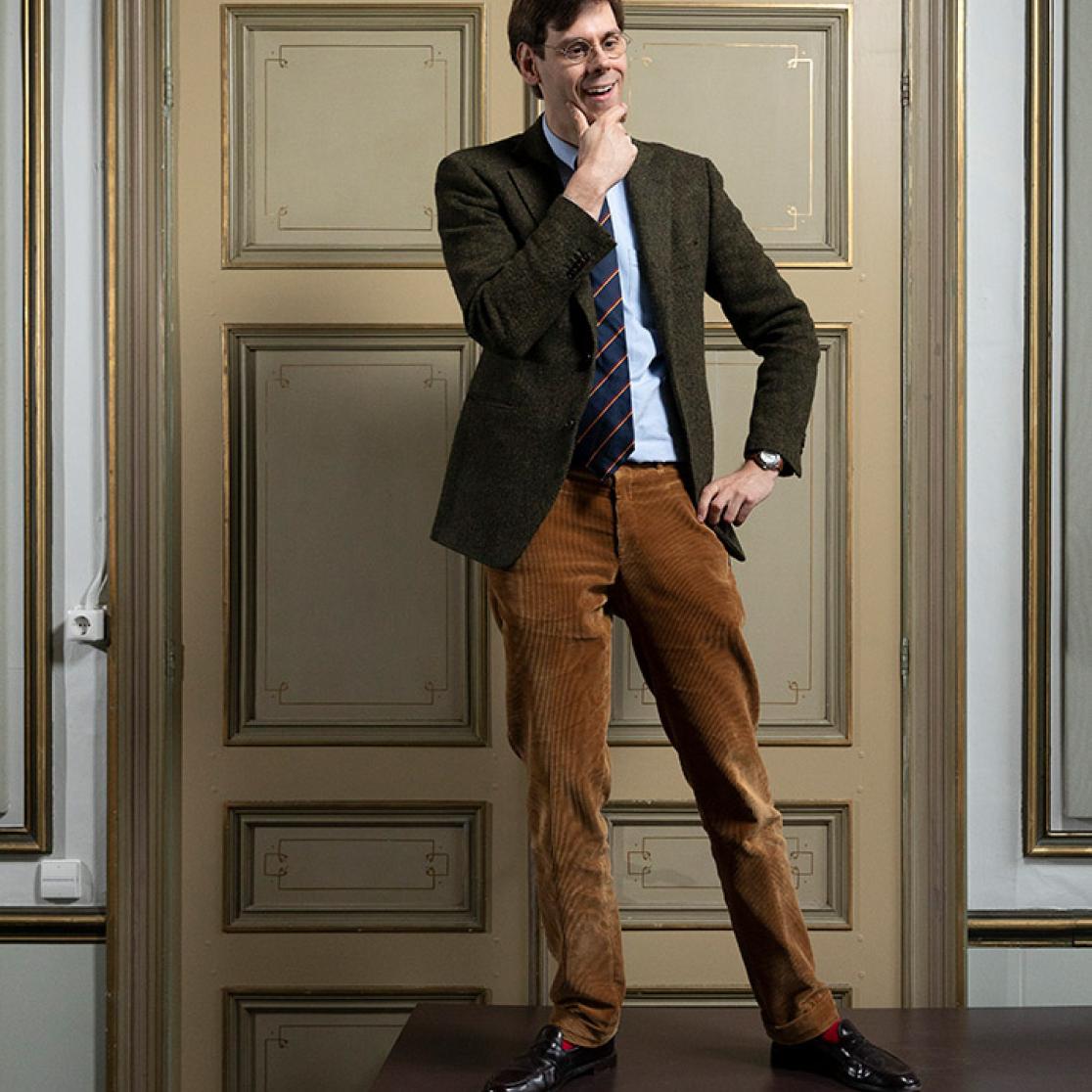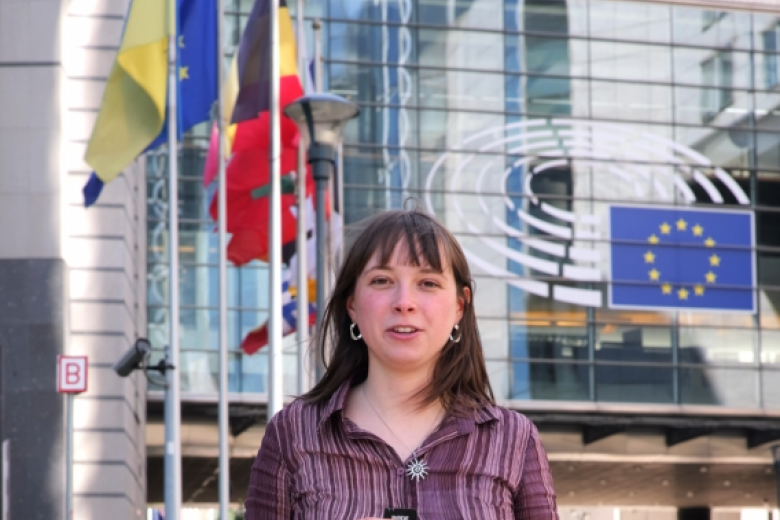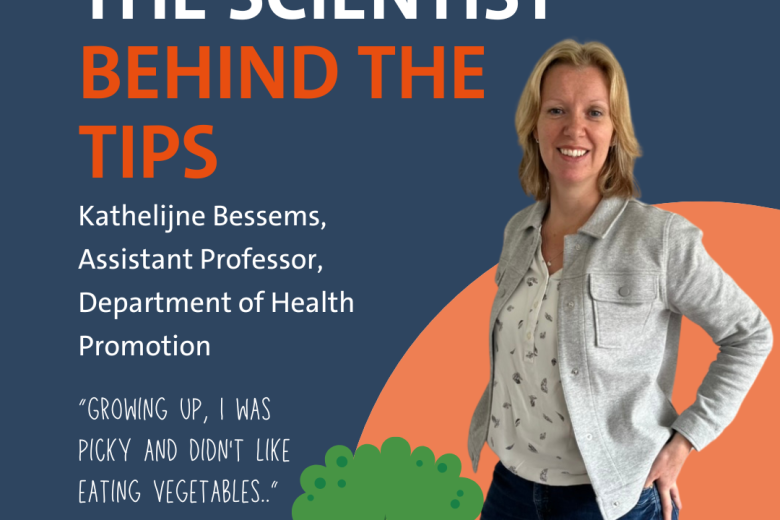Necessity as the mother of invention
Europe’s first Professor of Liberal Arts and Sciences, Teun Dekker, has it all: tea, whisky, UM’s arsenal of software for online teaching – and a giddy sense of excitement about all the innovation that the crisis will foster. UM’s buildings might be closed but its teaching is charging full steam ahead, evolving faster than ever.
The sun streaming through the windows is made intermittently visible by the steam rising from a cup of Darjeeling. Speaking from the safety of his apartment, Teun Dekker does not sound like a man persevering under a great strain. In fact, he sounds rather jolly. He – like everyone else at UM and, indeed, the world at large – has had to adapt to the emergency measures around the COVID-19 outbreak. That means moving all of his educational activities online.
A passionate teacher who does not shy away from improvising, he wholeheartedly embraces the new situation. “This is a wonderful opportunity for innovation!” Is he drawing on a rich well of experience teaching online? “No, I’ve never used any of those tools before Thursday,” he laughs, “but it’s been possible for a while now; universities have been investing in software and UM has done a good job letting us know what the possibilities and resources are."
Heady days of innovation and improvisation
He thinks the main impediment when it comes to online education is not technical feasibility but attitude. “People are set in their ways because they’re good at doing things in familiar ways.” Despite UM’s willingness to innovate, Dekker likens universities to oil tankers – it takes a lot of planning for minor course corrections. “But we’re forced to act fast now and I feel quite giddy that we’re being so decisive.”
Dekker is confident the UM community can do this. He has certainly rolled up his sleeves: he records video lectures (while taking the occasional sip of whiskey) and introductions for tutorial groups, which he has broken down into units of six students to allow for more fluent discussion online. “Apparently, you can also do video chats through Blackboard – I had no idea...” For the sake of greater scheduling flexibility, he has also set up discussion boards, which he moderates.
Adapting and improving
Written discussion has had some surprising upsides: “You see how rather shy students are now making carefully considered contributions. Some people might need so much time to think out their responses that the conversation would have moved on by the time they get there.” Of course, the way of interacting changes – and not just in a negative way: “An online meeting forces you to be a good listener because interrupting ruins the flow of the conversation if you have a lag.”
The rest is just adapting, gradually, to the practicalities. “When recording video lectures, the default setting displays footage of yourself in real time – which I found very disorienting, so I turned it off. You also have no feedback, so you can’t be sure if everything lands and you have to be a bit more cautious with humour,” he laughs. “But it’s not like it changes everything: students still respond to passion, to feeling that they’re being taken seriously, and to learning new things.”
UCM is all about the resident community, face-to-face interaction, and small scale tutorials – all of which are adversely affected. “I record lectures, we have discussions and tutorials, the exam would have been a written assignment anyway, etc. – so for my subject it’s pretty ok, really.” Dekker is a bit concerned with the coming period, especially establishing a sense of community among students. “Informal learning is vital. Students actually do most of the learning when they talk about the lectures over a coffee or the likes, so that’ll be a challenge.”
The crisis as spark and teachable moment
Might the new format or the circumstances necessitating it even be helpful to illustrate some of the learning goals? “I imagine my colleagues in Science and Technology Studies are having a field day,” he laughs. “For us it’s certainly relevant, because you can think about how different forms of government can respond to such a crisis. How effective can a modern democracy be? China has bought us a lot of time because they acted very decisively – but how much of our freedom would we be willing to give up for that? There will certainly be exam questions about that.”
The answers aren’t self-evident. Dekker and his students will have plenty of possibilities to contemplate the big social and moral issues of our time without straying too far from the news. “More than anything though, it makes you realise how lucky we’ve been, and how nice it is to have face to face interactions.”
While clearly having a lot of fun experimenting with all the tools at UM’s disposal, Dekker also relishes the sense of solidarity that this crisis has brought about. “I have contact with my students; I exchange ideas with colleagues… It really goes to show that the university isn’t the buildings but the connections between people.”

Also read
-
Europe Day
To celebrate Europe Day on 9 May, FASoS student Lisa travelled to Brussels to meet with five of our inspiring alumni who are currently shaping European policy and advocacy. In this video, they share why Europe Day matters, how it’s celebrated in Brussels, and what the idea of Europe means to them.

-
The Green Office Catalyses Circularity Projects’ Autonomy
This semester, the Green Office cultivated the untapped potential of the Community Garden and the Clothing Swap Room. We hope that these Circularity Projects will operate under autonomous, functional organisations by this time next year, with continued support from the Green Office and the SUM2030...
-
Evidence-based health tips for students: the science of eating healthy
In the upcoming months, we’ll share tips on Instagram for our students on how to live a healthier life. Not just a random collection, but tips based on actual research happening at our faculty. The brains behind this idea are Lieve Vonken and Gido Metz, PhD candidates at CAPHRI, the Care and Public...
